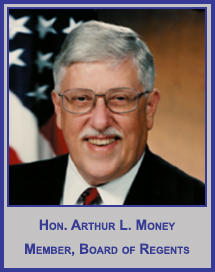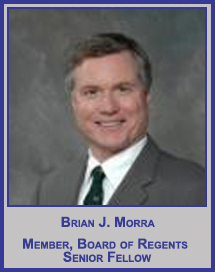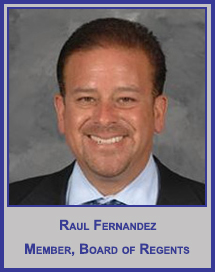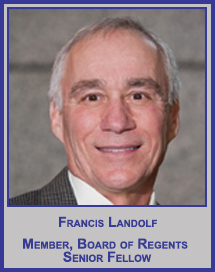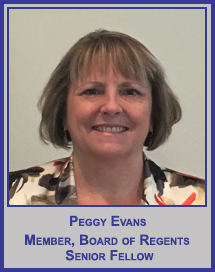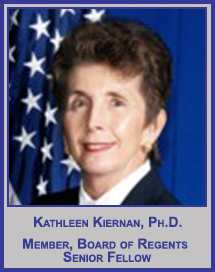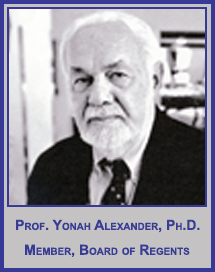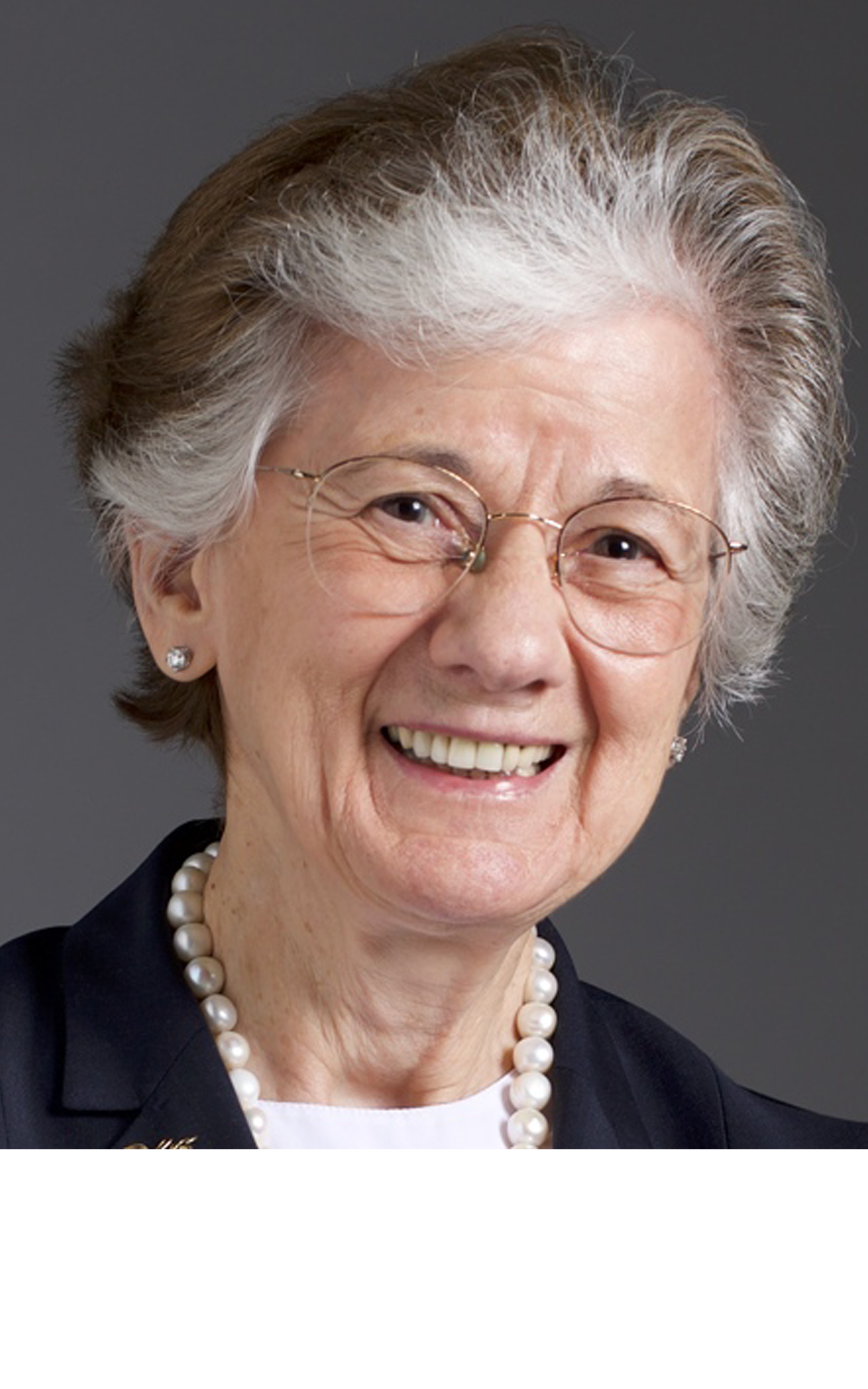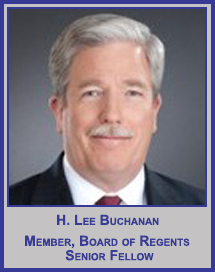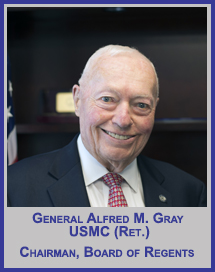Staff
Board of Regents
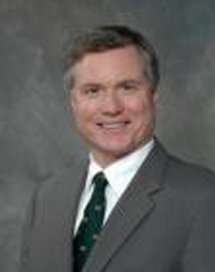 Brian J. Morra has 40 years of experience in general management, strategic planning, and business development in the aerospace and defense industry and as a board member in biotechnology, aerospace, academia, and sports management.
Brian J. Morra has 40 years of experience in general management, strategic planning, and business development in the aerospace and defense industry and as a board member in biotechnology, aerospace, academia, and sports management.
He is Executive Chairman of the board of the Canadian company CAE’s United States Proxy Board.
He is a member of the Bain Company’s board of advisors (A&D practice).
Mr. Morra also is an advisor to the CEO and leadership team at Fusion Constructive, a commercial software company focused on leveraging game technology for the Defense market.
Mr. Morra is the former executive chairman of the board at Akonni Biosystems and is currently on the CEO’s advisory board.
He also serves as chairman of the advisory board of the Armed Forces Cycling Classic.
He is a member (past president) of the College of William and Mary’s Graduate School of Arts and Sciences advisory board.
Lastly, Mr. Morra is a member of the Board of Regents and Senior Fellow of the Potomac Institute for Policy Studies.
At Northrop Grumman Mr. Morra spent 12 years as a sector vice president responsible for strategy, mergers and acquisitions, business development, and investment planning in Northrop Grumman Corporation’s Mission Systems Sector, which has annual revenues of about $12B.
He was a member of the Northrop Grumman corporate Strategic Development Council, providing direct advice to Northrop Grumman’s Chief Executive Officer and his immediate staff. Mr. Morra retired from Northrop Grumman in October 2016.
Prior to joining Northrop Grumman in 2004, Mr. Morra was General Manager of the Transformation & Simulation business unit at General Dynamics. This business grew at an annual rate of 35 percent under Mr. Morra’s P&L leadership.
Prior to the acquisition of Veridian Corporation by General Dynamics in 2003, he served for five years as President of Veridian’s Advanced Systems & Technology Sector – a high technology business with commercial and government clients. He also assisted the Veridian corporate staff on mergers and acquisition projects and with the integration of newly acquired firms.
Mr. Morra served 11 years as an executive at the privately held firm Pacific-Sierra Research Corporation. After a series of increasingly responsible management positions, Mr. Morra was appointed Senior Vice President and Chief Operating Officer of the company. Pacific-Sierra Research Corporation was acquired in 1998 by Veridian.
Mr. Morra’s government service includes a combined 15 years active and reserve duty in the U.S. Air Force as an intelligence officer, including overseas assignments and service on the Air Staff at the Pentagon.
Mr. Morra received a BA degree from the College of William & Mary, an MPA from the University of Oklahoma, and a MA degree in government and national security studies from Georgetown University. He is a graduate of Harvard Business School’s Advanced Management Program.
He is past President of the College of William and Mary’s Graduate School of Arts and Sciences Advisory Board. He was a long-time member of the advisory board at the University of Virginia’s School of Engineering and Applied Sciences. Mr. Morra is a former director of the CEA Corporation, with headquarters in Canberra, Australia.
 Francis Landolf,Member, Board of Regents, and Senior Fellow
Francis Landolf,Member, Board of Regents, and Senior Fellow
Francis Landolf is a Senior Fellow and a member of the Board of Regents. He currently serves as a Principal with Core Consulting, LLC. Fran created Core Consulting to provide a vehicle for him to match private sector solutions with public sector problems. Through his board and networking activities he becomes aware of private sector innovation in start-ups and attempts make this innovation visible to the missions within the IC and Defense establishments. Fran has performed executive coaching and leadership development for both private and public sector executives and teams. He is currently an advisor to a number of small innovative product companies that are or have potential to address both government and commercial applications. Before creating his consulting practice he led public sector organizations responsible for delivering time critical services essential for informed military and National level decisions at the National Security Agency. The organizations he created and led performed analysis cryptographic systems, unknown signals, communications systems and computer networks. They also developed and deployed the processing solutions that transformed network and communications data into a form consumable by intelligence analysts.
Fran currently serves on the board of the Hume Center of the Virginia Polytechnic Institute and State University, the Human Language Technology Center of Excellence at Johns Hopkins University and the Cyber Incubator at University of Maryland, Baltimore County. He has previously served on the Technical Advisory Group for the Senate Select Committee for Intelligence, the National Academy of Sciences Committee on Science and Technology for Defense Warning, MITRE Corporation Intelligence Advisory Board, and on several panels of the National Security Agency Advisory Board.
 Jeffrey Baxter is currently a consultant/contractor for a number of US Government agencies and advises military, government, defense contractors and civilian groups on missile defense, terrorism & counter-terrorism, cyber-warfare, intelligence, virtual reality, war gaming, next-generation technologies and unconventional strategies. He is a member of the Director's Strategic Red Team at MIT/ Lincoln Laboratories, a consultant for the Global Security Sector of the Lawrence Livermore National Laboratory and a Senior Thinker for the Institute For Human & Machine Cognition.
Jeffrey Baxter is currently a consultant/contractor for a number of US Government agencies and advises military, government, defense contractors and civilian groups on missile defense, terrorism & counter-terrorism, cyber-warfare, intelligence, virtual reality, war gaming, next-generation technologies and unconventional strategies. He is a member of the Director's Strategic Red Team at MIT/ Lincoln Laboratories, a consultant for the Global Security Sector of the Lawrence Livermore National Laboratory and a Senior Thinker for the Institute For Human & Machine Cognition.
 The Honorable Donald M. Kerr, Ph.D. Member, Board of Regents and Senior Fellow
The Honorable Donald M. Kerr, Ph.D. Member, Board of Regents and Senior Fellow
Dr. Donald M. Kerr is chairman of the Board of Trustees of the MITRE Corporation. He first joined the board in 2009, was named vice chairman in 2014, and elevated to chairman in 2018. He also serves as a director of Michael Baker International, LLC; and Orbis Operations, LLC. Previously, he was confirmed by the Senate on October 4th, 2007 as principal deputy director of national intelligence and served in that position until January 20th, 2009.
From July 21st, 2005, Dr. Kerr was the fifteenth director of the National Reconnaissance Office and concurrently served as the assistant to the Secretary of the Air Force for Intelligence Space Technology. Prior to that he was deputy director for science and technology at the Central Intelligence Agency since August 2001,
From October 1997 until August 2001, Dr. Kerr was an assistant director of the Federal Bureau of Investigation in charge of the Laboratory Division. Dr. Kerr’s previous government service was with the Department of Energy from August 1976 through July 1979, first in Las Vegas as deputy manager of Nevada Operations, and subsequently in Washington, D.C., as the deputy assistant secretary and acting assistant secretary for Defense Programs and later for Energy Technology.
Dr. Kerr has held several key executive positions in private industry. From 1993 through 1996, he was corporate executive vice president and a director at Science Applications International Corporation. Dr. Kerr was president and a director of EG&G, Inc., from 1989 through 1992. He served as a director of Resources for the Future from 1990 through 1999 and on the executive committee of the National Association of Manufacturers Board from 1987 through 1992.
Dr. Kerr was the fourth director of the Los Alamos National Laboratory from 1979 to 1985. He was also employed at Los Alamos from 1966 until 1976, conducting and leading research in high altitude weapons effects, nuclear test detection and analysis, weapons diagnostics, ionospheric physics, and alternative energy programs.
Dr. Kerr received his bachelor’s degree in electrical engineering in 1963 and went on to earn an M.S. (1964) in microwave electronics and a Ph.D. (1966) in plasma physics and microwave electronics, all from Cornell University. He is a fellow of the American Physical Society and the American Association for the Advancement of Science. His awards include: DOE Outstanding Service Medal, CIA Distinguished Intelligence Medal, Secretary of Defense Medal for Outstanding Public Service, NRO Distinguished Service Medal, and the National Intelligence Distinguished Service Medal.
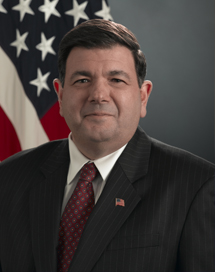 The Honorable Zachary J. Lemnios is a Senior Executive with over 40 years of experience in industry, government and academia, who has led the development and application of advanced technologies for national and global security. He served as Vice President of Research Strategy and Worldwide Operations, Vice President of Physical Sciences, and Vice President of Government Programs, globally across IBM Research.
The Honorable Zachary J. Lemnios is a Senior Executive with over 40 years of experience in industry, government and academia, who has led the development and application of advanced technologies for national and global security. He served as Vice President of Research Strategy and Worldwide Operations, Vice President of Physical Sciences, and Vice President of Government Programs, globally across IBM Research.
Prior to joining IBM, Mr. Lemnios served three terms in high level civilian leadership in the Department of Defense with detailed and extended interactions across the whole of US government and with leaders across US allied nations. Mr. Lemnios was confirmed as The Honorable Assistant Secretary of Defense (Research & Engineering) by the United States Senate. In this position, Mr. Lemnios was the Chief Technology Officer for Department of Defense and shaped the Department’s technical strategy to support the President’s national security objectives and the Secretary’s priorities. He launched Department and international initiatives in large data analytics, decision support, engineering education, electronic warfare, cyber, autonomy, advanced propulsion, hypersonics, and directed energy concepts as future capabilities for the nation. Mr. Lemnios received special recognition from the Australian Government Department of Defence and was awarded Office of Secretary of Defense Medal for Exceptional Public Service and the Office of Secretary of Defense Medal for Outstanding Public Service.
Lemnios also served as the first Chief Technology Officer of MIT Lincoln Laboratory. He has authored over 40 papers, holds 4 patents in advanced GaAs device and MMIC technology and is a Life Fellow of the IEEE.
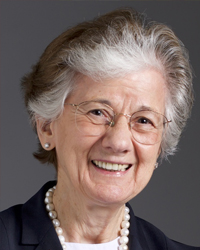 Dr. Rita Colwell’s interests are focused on global infectious diseases, water, and health and Dr. Colwell developed an international network to address emerging infectious diseases and water issues, including safe drinking water for both the developed and developing world, in collaboration with Safe Water Network, headquartered in New York City.
Dr. Rita Colwell’s interests are focused on global infectious diseases, water, and health and Dr. Colwell developed an international network to address emerging infectious diseases and water issues, including safe drinking water for both the developed and developing world, in collaboration with Safe Water Network, headquartered in New York City.
Dr. Colwell served as the 11th Director of the National Science Foundation, 1998-2004. In her capacity as NSF Director, she served as Co-chair of the Committee on Science of the National Science and Technology Council. One of her major interests includes K-12 science and mathematics education, graduate science and engineering education, and increased participation of women and minorities in science and engineering.
Dr. Colwell served as President of the University of Maryland Biotechnology Institute and Professor of Microbiology and Biotechnology at the University Maryland. She was also a member of the National Science Board from 1984 to 1990.
Dr. Colwell has been awarded 63 honorary degrees from institutions of higher education, including her Alma Mater, Purdue University and is the recipient of the 2005 Order of the Rising Sun, Gold and Silver Star, bestowed by the Emperor of Japan, the 2006 National Medal of Science awarded by the President of the United States, the 2010 Stockholm Water Prize awarded by the King of Sweden, the 2017 Vannevar Bush Award from the National Science Foundation, the 2017 International Prize for Biology from the Japan Society for the Promotion of Science, the 2017 Chevalier de la Légion d’Honneur (“Knight of the Legion of Honor”) bestowed by the Ambassador of France, and the 2018 Lee Kuan Yew Water Prize of Singapore. Dr. Colwell is an honorary member of the microbiological societies of the UK, Australia, France, India, Israel, Bangladesh, and the U.S. and has held several honorary professorships, including the University of Queensland, Australia. A geological site in Antarctica, Colwell Massif, has been named in recognition of her work in the Polar Regions.
Dr. Colwell has held many advisory positions in the U.S. Government, nonprofit science policy organizations, and private foundations, as well as in the international scientific research community. She is a nationally-respected scientist and educator, and has authored or co-authored 19 books and more than 800 scientific publications. She produced the award-winning film, Invisible Seas, and has served on editorial boards of numerous scientific journals. She serves as Chair of the Research Board for the Gulf of Mexico Research Initiative (2010-2020).
Dr. Colwell has previously served as Chairman of the Board of Governors of the American Academy of Microbiology and also as President of the American Association for the Advancement of Science, the Washington Academy of Sciences, the American Society for Microbiology, the Sigma Xi National Science Honorary Society, the International Union of Microbiological Societies, and the American Institute of Biological Sciences (AIBS). Dr. Colwell is a member of the U.S. National Academy of Sciences, the Royal Swedish Academy of Sciences, Stockholm, the Royal Society of Canada, the Royal Irish Academy, the Bangladesh Academy of Science, the Indian Academy of Science, the American Academy of Arts and Sciences, and the American Philosophical Society.
Born in Beverly, Massachusetts, Dr. Colwell holds a B.S. in Bacteriology and an M.S. in Genetics, from Purdue University, and a Ph.D. in Oceanography from the University of Washington.
 Doug Wolfe is a member of the Board of Regents and Senior Fellow. Mr. Doug Wolfe has been Member of Government Advisory Board at TransUnion since August 2018. A recognized federal government leader, Mr. Wolfe served 33 years with the CIA and was its Associate Deputy Director of Science and Technology. He retired from federal service in December 2017 and today he oversees operations at BlackLynx, which specializes in high-performance analytics and computing. He served as Chief Information Officer (CIO) at the CIA from 2013 to 2016, in charge of Agency Information Technology (IT) vision and strategic direction, along with advising the Intelligence Community (IC). Throughout his career, he served multiple CIA positions, among them were Deputy Director for Acquisition, Technology, and Facilities at the Office of the Director of National Intelligence (ODNI); Deputy Director of the Office of Global Access (OGA) and Program Manager overseeing the end-to-end system acquisition of an innovative new source and method for the Intelligence Community. He holds a bachelor's degree in mechanical engineering from the University of Southern California, and a master's degree in system engineering from Virginia Tech.
Doug Wolfe is a member of the Board of Regents and Senior Fellow. Mr. Doug Wolfe has been Member of Government Advisory Board at TransUnion since August 2018. A recognized federal government leader, Mr. Wolfe served 33 years with the CIA and was its Associate Deputy Director of Science and Technology. He retired from federal service in December 2017 and today he oversees operations at BlackLynx, which specializes in high-performance analytics and computing. He served as Chief Information Officer (CIO) at the CIA from 2013 to 2016, in charge of Agency Information Technology (IT) vision and strategic direction, along with advising the Intelligence Community (IC). Throughout his career, he served multiple CIA positions, among them were Deputy Director for Acquisition, Technology, and Facilities at the Office of the Director of National Intelligence (ODNI); Deputy Director of the Office of Global Access (OGA) and Program Manager overseeing the end-to-end system acquisition of an innovative new source and method for the Intelligence Community. He holds a bachelor's degree in mechanical engineering from the University of Southern California, and a master's degree in system engineering from Virginia Tech.
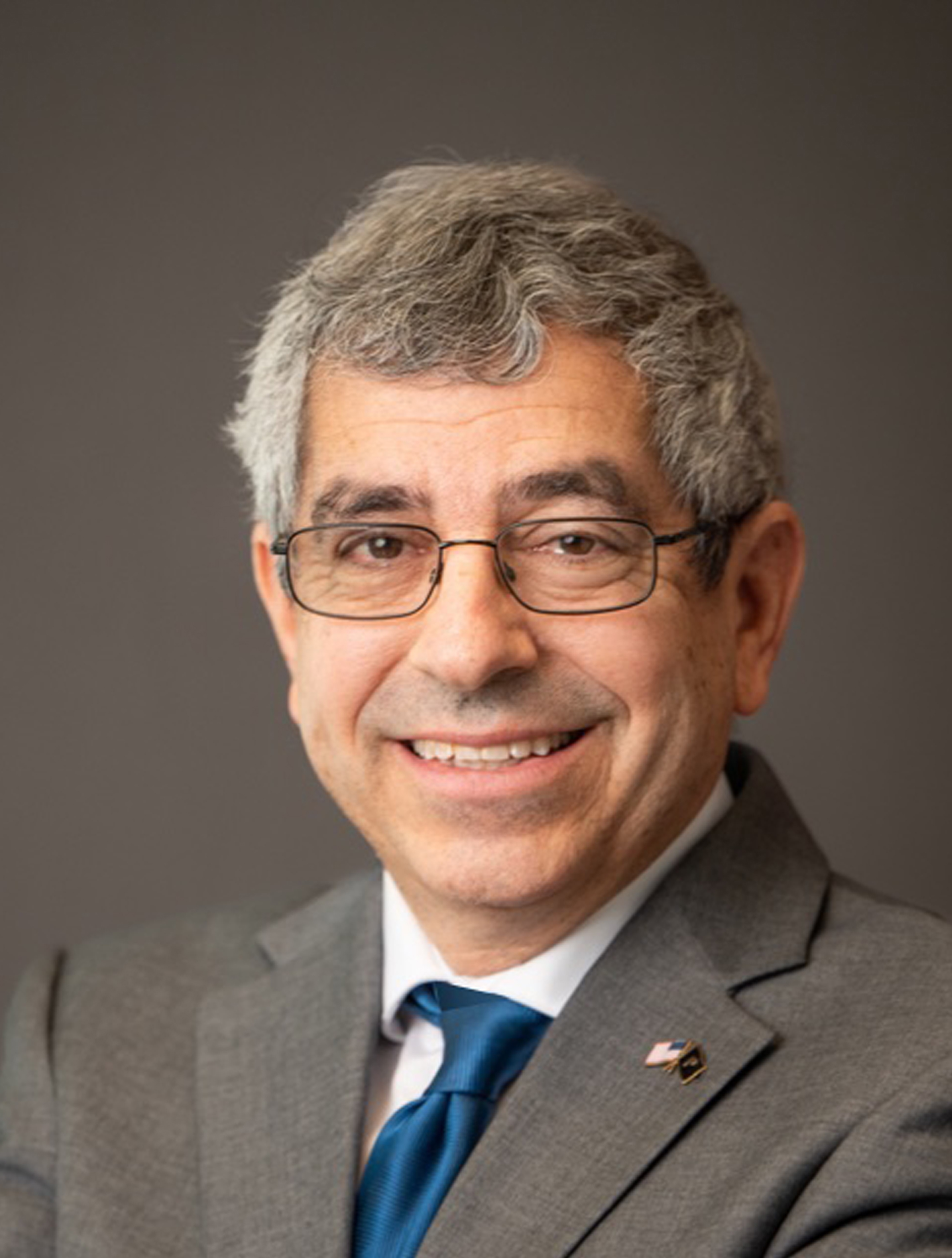 Mark Lewis, Ph.D., member, Board of Regets
Mark Lewis, Ph.D., member, Board of Regets
Dr. Mark Lewis is the Chief Executive Officer for the Purdue Applied Research Institute providing thought leadership and domain expertise across PARI’s national security, global development, infrastructure research, and technology acceleration initiatives to take on our nation’s most challenging problems. With a focus on creating new strategic private-public-academic partnerships, Dr. Lewis connects PARI programs with a broad array of industry, federal agencies, entrepreneurs, and academic collaborators. Previously Dr. Lewis’s distinguished career includes leadership as Executive Director of NDIA’s Emerging Technologies Institute, Director of Defense Research & Engineering in the Department of Defense, Chief Scientist of the U.S. Air Force, acting Deputy Under Secretary of Defense for Research & Engineering, Director of the Science and Technology Policy Institute, and professor emeritus at the University of Maryland, where he served as the Willis Young, Jr., Professor and Chair of the Department of Aerospace Engineering.
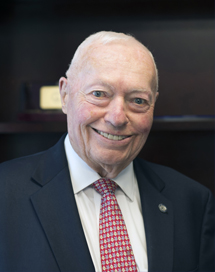 General Al Gray, USMC (Ret) serves as Chairman of the Board of Regents; Member of the Board of Directors; and Senior Fellow of the Potomac Institute of Policy Studies (PIPS). The PIPS serves as a non-partisan, not-for-profit policy research institute that provides an academic forum for the study of key national security, science and technology, and related policy issues. In addition to participating in monthly seminars related to the global terrorism challenge, he oversees the Center for Emerging Threats and Opportunities (CETO), which operates as a futuristic think tank for the Marine Corps at Quantico.
General Al Gray, USMC (Ret) serves as Chairman of the Board of Regents; Member of the Board of Directors; and Senior Fellow of the Potomac Institute of Policy Studies (PIPS). The PIPS serves as a non-partisan, not-for-profit policy research institute that provides an academic forum for the study of key national security, science and technology, and related policy issues. In addition to participating in monthly seminars related to the global terrorism challenge, he oversees the Center for Emerging Threats and Opportunities (CETO), which operates as a futuristic think tank for the Marine Corps at Quantico.
General Gray has served as Board Chairman and CEO for several public and private companies and has consulted to United States and international industry and government. General Gray’s other duties have included service on the Defense Science Board; the Defense Special Operations Advisory Group; the National Security Agency Science Advisory Board; the National Reconnaissance Office Gold Team; the Defense Operations Support Office Advisory Team; and as Director of the Advanced Concept Demonstration Technology for Combat in the Littorals. Consistent with his interest in education and helping servicemen and women, he is trustee Emeritus of Norwich University, past trustee on Monmouth University, past member of the National Defense University Board of Visitors and is Chairman Emeritus of American Military University. He is Chairman Emeritus of The Injured Marine Semper Fi Fund and the America Fund, having served over ten years, to help take care of wounded veterans and their families.
General Gray currently serves as Chancellor of The Marine Military Academy, Chairman of the US Marine Youth Foundation, Board of Trustee Chairman at the American Public University System, and Senior Mentor to the Defense Science Study Group.
In 1991, Al Gray retired after 41 years of service to the United States Marine Corps. From 1987-1991, General Gray served as a member of the Joint Chiefs of Staff, was the 29th Commandant of the Marine Corps, and was advisor to both Presidents Reagan and George H. W. Bush. As Commandant, he instituted and published a Warfighting Philosophy for Marines based on the Maneuver Warfare Thought Process. General Gray developed and implemented a new long-range strategic planning process for the Marine Corps, established the Marine Corps University, and implemented other longstanding changes, such as ensuring that every Marine is a rifleman first and that the Marine Corps was Special Operations Capable.
General Gray enlisted in the Marine Corps in 1950 and achieved the rank of Sergeant while serving in amphibious reconnaissance with Fleet Marine Force, Pacific aboard the submarine USS Perch (ASSP-313). He was commissioned a Second Lieutenant in 1952. In the early years, he held extensive assignments overseas in the Far East and Southeast Asia in infantry, artillery, intelligence, communications and special operations. He has held every infantry command assignment from platoon commander through Division Commander and has commanded every Marine Air Ground Task Force from Marine Corps Expeditionary Unit to Marine Expedition Force.
Among his awards are two Defense Distinguished Service Medals, two Navy Distinguished Service Medals, Distinguished Service Medals from the US Army, the US Air Force and the US Coast Guard, the Silver Star Medal, two Legion of Merits with Combat "V", four Bronze Star Medals with Combat "V", three Purple Hearts, three Joint Commendation Medals, the Meritorious Service Medal, the Navy Commendation Medal, the Vietnamese Cross of Gallantry with Palm and Star, as well as foreign awards from Argentina, Brazil, Chile, Columbia, Korea and The Netherlands.
General Gray holds a B.S. from the University of the State of New York. He also attended Lafayette College, the Marine Corps Command and Staff College and the Army War College. General Gray is the recipient of two honorary Doctor of Law degrees, one from Lafayette College and the other from Monmouth University, and was awarded a Doctor of Military Science from Norwich University. He was the first awardee of an Honorary Doctorate of Strategic Intelligence from the Defense Intelligence College (now the Joint Military Intelligence College), was awarded an Honorary Doctorate for Leadership from the Franklin University, an Honorary Doctorate for Public Service from the American Public University System, and an Honorary Doctorate of Warfare Studies from the Marine Corps University.
In 2008, General Gray was inducted into the National Security Agency Hall of Honor for rendering distinguished service to American Cryptology.

